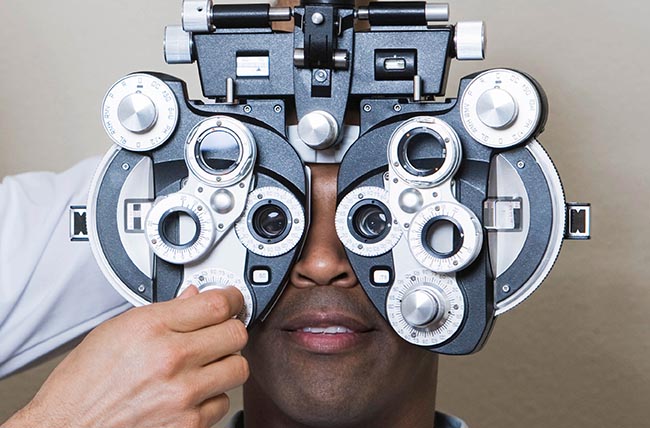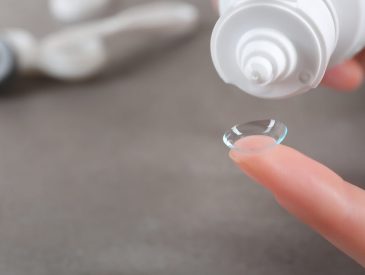A thorough eye exam typically lasts between 20 and 60 minutes. But there are some things that might make you stay longer in the optometrist’s office. Here are some things to think about when scheduling an appointment for your eyes.
Discover how each of these elements affects how long it takes to complete your eye exam by reading on.
Table of Contents
What Determines How Long An Eye Exam Takes?
Your eye exam may take more or less time depending on:
- Whether you need contacts in addition to glasses
- Whether the optometrist dilates your pupils
- Any symptoms you’re experiencing
- Any previously diagnosed eye disorders or diseases
- Whether it’s your first visit to the office
- Your age
- Your and your family’s medical history
It’s one thing if you drop by for a routine eye exam with a familiar optometrist. Your exam might only take a leisurely 30 minutes or less in that situation. However, if you’re a new patient with a variety of symptoms, need contact lens fitting, or need to have your pupils dilated, your appointment may go over 30 minutes.
Read about
What Happens During An Eye Exam?
A series of tests are performed during eye exams to evaluate both your vision and your overall ocular health. Some components you may experience include:
- A visual acuity test (you’ll probably read an eye chart with progressively smaller rows of letters)
- A peripheral vision test (you’ll be asked to spot changes or movement in your peripheral vision)
- A refraction exam(you’ll look through various lenses to determine the prescription for your corrective lenses)
- Binocular testing (the optometrist will assess how your eyes move in case of abnormalities)
- A slit-lamp exam (the optometrist will use a slit-lamp microscope to assess certain internal and external eye structures)
- Eye pressure measurement (the optometrist will use tonometry to measure your intraocular pressure)
- A dilation exam (the optometrist will examine the back of your eye to assess your retinal health)
- A color vision test (you’ll be shown images that test for color blindness)
For even more detail on the above components, read: What to Expect at an Eye Exam.
How Long Does An Eye Exam With Dilation Take?
It may take an hour or longer for an optometrist to examine your eyes while dilating your pupils. This is due to the fact that eye drops that dilate your eyes may not start working fully for up to 30 minutes (or even longer if you’re taking certain eye medications).
Once your pupils have dilated, the optometrist will be able to see through them to examine the retina and optic nerve, among other internal structures of your eyes.
Your pupils may not need to be dilated for every eye exam; this will depend on your medical history, the last time they were dilated, the strength of your prescription, and other factors. Some eyecare offices now have advanced machinery that can photograph the back of the eye without first dilating your pupils (this may require an additional fee on top of the cost of an eye exam). Talk to your doctor about the best course of action for your retinas and yourself.
How Long Will My Pupils Stay Dilated?
Although it varies from patient to patient, your pupils may continue to dilate for up to six hours after an eye exam. It’s important to plan ahead by bringing sunglasses to the appointment and having a ride home arranged for afterward. As the effects of the drops wear off, close-up work might not be possible because you’ll be sensitive to bright light and glare, especially from screens. Following your exam, it’s best to stay away from reflective surfaces and give your eyes as much rest as you can.

Types of Eye Exams
There are several types of eye exams depending on your visual health needs. Some common types of eye examinations are:
- Contact lens exams
- Comprehensive eye exams
- Computer vision syndrome exams
- Digital retina exams
Comprehensive Eye Exams
These are the “regular” checkups that you probably think of when you hear the words “eye exam.” During a comprehensive eye exam, your eye doctor will:
- Consult your medical history and records to assess your current and future eye health
- Evaluate your current visual needs
- Assess your complete optical system
- Test your eyes for diseases such as glaucoma, retinal detachmentand diabetic retinopathy
- Your eye doctor will talk to you about your concerns regarding eye health after your examination. They’ll also talk to you about your treatment options.
Contact Lens Exams
You need both a thorough eye exam and a contact lens exam if you wear or want to wear contacts. During a contact lens exam, your eye doctor will:
- Test your vision with contacts using various methods.
- Evaluate your film tear to make sure you have enough tears to wear contacts comfortably
- Provide you with a contact lens prescription, which is different than your eyeglasses prescription
- Give you a trial set of contacts to wear for a few days. In a week, you’ll need a follow-up exam to make sure you have adjusted to your new lenses
What to Expect During An Eye Exam
Before Your Eye Exam
There are many preparations you can make before visiting an eye doctor. Tips and tricks for making sure your eye exam runs smoothly include:
- Consult with your insurance provider to see what portion of your eye care expenses are covered, so you know what to expect
- Bring your contact lenses, contact lens case & eyeglasses
- Bring a list of past/current prescriptions or medications
- Try your best to gather as much as you can about your family medical history before your eye exam
- Be prepared to discuss your vision needs, questions and concerns
During Your Eye Exam
During an eye exam, your doctor will do the following:
- Consult your medical history and records to assess your current and future eye health
- Evaluate your current visual needs
- Assess your complete optical system
- Test your eyes for diseases such as glaucoma, retinal detachmentand diabetic retinopathy
- Your eye doctor will address your concerns about eye health after your examination. They will also talk to you about your treatment options.
After Your Eye Exam
If your eyes have been dilated during the eye exam, you may experience symptoms afterward. These symptoms may include:
- Blurry vision (Check for Can Dry Eyes Cause Blurry Vision? )
- Sensitivity to light
To protect your eyes after an eye dilation, you can:
- Avoid driving, reading or looking at screens
- Wear sunglasses
Is a Contact Lens Exam Different from An Eye Exam?
Yes, a contact lens examination includes a fitting in which the physician takes additional measurements and evaluates the tear film, visual correction, comfort, and fit of a particular contact lens. It can be done concurrently with a thorough eye exam, but you should let your optometrist know in advance if you plan to wear contacts.
If it’s your first time wearing contacts, this process also includes training on how to insert and remove them. These steps all guarantee that your contacts will be the ideal size, comfortable to wear, and provide the best vision possible.
Read about Can You Use Contact Solution As Eye Drops?
How Long Does It Take to Get Prescription Glasses After An Eye Exam?
Expect to wait 7–10 business days to get new prescription glasses following your eye exam, though quicker turnaround times are possible (especially with expedited shipping). Also keep in mind that once you have received your prescription following an eye exam, you can use it to order glasses from any optical shop, both online and in person.
Even though this practice may lead to hurried decisions and a constrained selection of frame options, some offices may claim that you can take home new glasses the same day as your examination.
How Long Does It Take to Get Contacts After An Eye Exam?
Contact lenses that you order online or from an optometrist’s office usually arrive in about a week (or less, with expedited shipping). However, you can put on trial lenses that your eye doctor gives you after your appointment right away. Whether they wear Scout, our own brand of contact lenses, or a different brand, the majority of patients at Warby Parker locations leave their appointments with a finalized contact lens prescription or trial lenses.
Do I Need An Eye Exam?
It’s incredibly difficult to tell if someone has eye problems just by looking at them. However, you should be able to determine for yourself if your vision isn’t as sharp as it once was or if you are exhibiting other symptoms that indicate you might benefit from seeing an eye doctor. Some of the things to look out for include:
- Blurred vision
- Headaches and migraine
- Distorted vision
- Issues with depth perception, reaction times and other visual skills
- Tired, itchy and dry eyes
- Swelling or puffiness around the eyes
- Recurrent pain in or around the eye
- Seeing abnormalities, such as flashes, rainbows haloes and spots
It’s always worth making an appointment with your eye doctor if you have any vision concerns rather than waiting for your regular yearly checkup.
How Often Should I Have An Eye Exam?
Your eye doctor will likely advise that you have an annual eye exam if you wear glasses or contact lenses or if you are over 40. This makes it possible to keep track of the health and condition of your eyes in addition to closely monitoring your vision to make sure it isn’t changing. As we age, we are more prone to eye diseases like cataracts, macular degeneration, and glaucoma, so it is crucial to pay attention to this. The long-term preservation of your vision is made possible by early detection and treatment of eye diseases. As their vision can change quickly as they grow, children should also have yearly eye exams.
Set Some Time Aside for Your Eyes
How long are eye exams then? Allocate an hour for the exam itself, keeping in mind that you may require more time to relax while your pupils are dilated.
The length of your appointment should be determined by how much time is required to ensure the health of your eyes and vision, even though the precise number of minutes or hours you spend at the eye doctor may vary.





